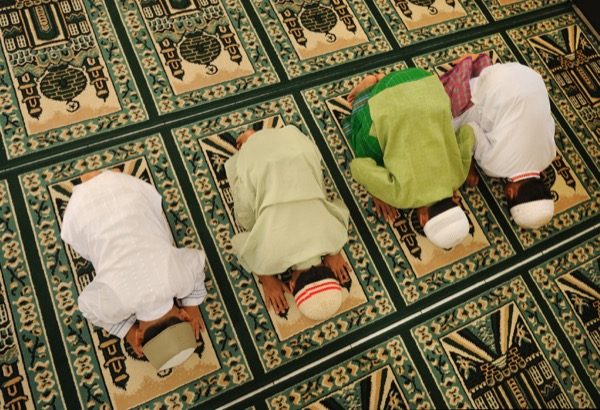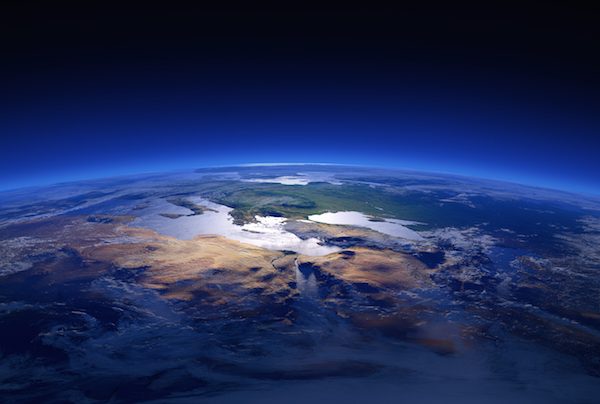
Hazrat Mirza Ghulam Ahmad (as), The Promised Messiah & Imam Mahdi
The Promised Messiah (as) wrote over 80 books in Arabic, Urdu, and Persian. Excerpts of his collected works have been translated into English and organised by topic. The Review of Religions is pleased to present these excerpts as part of a monthly feature. In this edition, the Promised Messiah (as) expounds upon the philosophy of divine chastisement, why hell is not everlasting, and the three grades of heaven and hell.
This is the third part of a multi-part series.
Extracts from The Essence of Islam, Vol. II, 451-460.
The Wrath of God Has a Spiritual Philosophy
The Holy Qur’an does not describe the wrath of God Almighty as it is described in the Vedas. Rather, the wrath described in the Holy Qur’an has spiritual philosophy. For instance, regarding the nature of divine punishment, the Holy Qur’an says:
نَارُ اللّٰہِ الۡمُوۡقَدَۃُالَّتِیۡ تَطَّلِعُ عَلَی الۡاَفۡـِٕدَۃِ
[1]
What is hell? It is the fire which sets the hearts ablaze.
It means that when a person develops corrupt ideas in his heart, which are opposed to the perfection for which man has been created, then as one who is hungry and thirsty dies from lack of food and water, in the same way, the one who is occupied with corrupt ideas and is deprived of God’s love and of obedience to Him, which are like food and water, also dies. Thus according to the teaching of the Holy Qur’an, a person himself prepares the means of his destruction and is not in any way forced by God. For instance, when a person shuts all the windows of his room and leaves none of them open, doubtless his room will become dark. The shutting of the windows is his action and making the room dark is God’s action according to the law of nature. In the same way, when a person commits a sin God Almighty thereafter manifests His action which becomes the punishment of the sin. Yet God does not shut the door of repentance, as when the occupant of a dark room opens a window God Almighty pours light into the room.
Thus according to the Holy Qur’an, the wrath of God does not mean that He becomes angry by bringing about an undesirable change in His condition. When a person is angry, he falls into distress and feels a sort of pain and loses his happiness, but God is always happy and suffers no distress. His wrath means that as He is Holy, He does not desire that His servants should adopt ways of impurity and demands that impurity should be swept away. If a person persists in impurity, God, the Holy, deprives him of His grace which is the basis of life and joy and comfort and that condition becomes the source of torment for the disobedient one. This might be illustrated as the case of a garden which is irrigated by the water of a stream but when the owners of the garden give up obeying the owner of the stream, the latter dams up the water of the stream and deprives the garden of it so that it dries up.
—Chashma-e-Ma‘rifat, Ruhani Khaza’in, vol. 23, pp. 62-63
Hell is Not Everlasting
It is unreasonable and is contrary to the perfect attributes of God, the Glorious, that once a person has been condemned to hell, only the divine attributes of chastisement should be manifested in his case and the attributes of mercy and forgiveness should be suspended forever and should not come into operation. From what God Almighty has said in His book, it appears that those condemned to hell shall dwell therein for a long period which is metaphorically described as forever, but then the attribute of mercy will be manifested and, as is mentioned in a hadith, God will stretch forth His hand into hell and all those who fall into His grip will be taken out of hell. This hadith indicates that in the end all will attain salvation as the hand of God is unlimited and no one can be left out of it.
Chashma Masihi, Ruhani Khaza’in, vol. 20, p. 369
He Who Devotes His Life to the Cause of God is a Martyr
There are many verses of the Holy Qur’an and many Ahadith, which show that the souls of people who are pure enter paradise as soon as they die. There are several Ahadith that mention that the martyrs will eat of the fruits of paradise. Almighty Allah says:
وَلَا تَحۡسَبَنَّ الَّذِیۡنَ قُتِلُوۡا فِیۡ سَبِیۡلِ اللّٰہِ اَمۡوَاتًا ؕ بَلۡ اَحۡیَآءٌ عِنۡدَ رَبِّھِمۡ یُرۡزَقُوۡنَ
[2]
Do not account those who are slain in the cause of Allah as dead. Indeed, they are living in the presence of their Lord and are provided for.
Previous books also support this. This proves that the souls of the pure will enter paradise. Now paradise will contain physical bounties of diverse types and fruits of many kinds and entry into paradise means that those bounties should be availed of. In such case the entry of the soul alone into paradise is meaningless and useless. Will the soul enter paradise and yet not be able to avail itself of its bounties? The verse:
وَادۡخُلِیۡ جَنَّتِیۡ
[3]
clearly shows that a believer is invested with a body after death. All great Muslim thinkers are agreed that pure believers are invested with a holy and bright body as soon as they die, through which they enjoy the bounties of paradise. To confine paradise at that stage to martyrs alone would amount to disbelief. Can a true believer commit such impertinence as to affirm that the Holy Prophet (peace and blessings of Allah be on him) under whose grave paradise lies, is outside paradise, but those who acquired faith and righteousness through him and became martyrs are dwelling in paradise and are eating of its fruits? The truth is that he who devotes his life to the cause of God is a martyr and the Holy Prophet (peace and blessings of Allah be on him) is the first of martyrs.
—Barahin-e-Ahmadiyya, Part V, Ruhani Khaza’in, vol. 21, pp. 388-390
An objection is raised that if every pure believer who is not burdened with sin enters paradise immediately on death, this would mean a rejection of resurrection and all its accompanying conditions, inasmuch as, according to the verse:
وَمَا ھُمۡ مِّنۡھَا بِمُخۡرَجِیۡنَ
[4]
their departing from paradise is not permissible. Thus, the whole system of resurrection and the events relating to the hereafter would be nullified.
The answer is that the Holy Qur’an teaches that pure believers enter paradise immediately on death and also teaches that there will be resurrection of the body and the dead will be revived and we believe in both. The only difference is that the entry into paradise on death is a general condition and the bodies that are bestowed on the believers immediately on death are imperfect. The day of the resurrection of the bodies is the day of the grand manifestation. On that day perfect bodies will be bestowed, but the connection of the dwellers of paradise with paradise will not be interrupted. From one aspect they will be in paradise, and from another aspect they will face God Almighty.
—Barahin-e-Ahmadiyya, Part V, Ruhani Khaza’in, vol. 21, p. 387, footnote
Three Grades of Heaven and Hell
Heaven and hell have three grades. The first grade, which is imperfect, begins when a person departing from this world enters his grave. This grade has been metaphorically described in the ahadith in several ways. One way is that for a righteous person a window is opened in the grave towards heaven through which he observes the splendour of heaven and enjoys its breezes. The size of this window corresponds to the grade of the faith or actions of the dead person. It is also recorded that those who leave the world in a condition in which they are wholly lost in God and who lay down their lives in the cause of the Beloved like the martyrs and siddiqs, who are even ahead of the martyrs, for them it is not merely a window that is opened into heaven, but they enter heaven with the whole of their beings and faculties. Nevertheless, they do not enjoy the delights of heaven to a perfect degree before the Day of Judgement.
In the same way, for the dead body of a wicked person a window is opened in the grave towards hell through which a consuming vapour arrives in the grave from hell and that wicked soul burns all the time in its flames. But for those who depart from the world in such condition that, on account of their persistent disobedience, they are wholly lost in Satan and in obedience to him they cut asunder altogether from God, it is not only a window that is opened for them after their death towards hell, they are cast into hell with their whole being and all faculties, as God has said:
مِمَّا خَطِیۡٓــٰٔتِھِمۡ اُغۡرِقُوۡا فَاُدۡخِلُوۡا نَارًا
[5]
Nevertheless, they are not subjected to the full torment of hell before the Day of Judgement.
There is a second stage of entry into heaven and hell which should be called the intermediate stage, which is attained after the resurrection, but before entry into the great heaven or the great hell. In this grade the faculties are sharpened and the manifestation of God’s mercy or His wrath is observed in a perfect way, and the delights of heaven or the torments of hell are felt more strongly on account of the nearness of the great heaven or the great hell, as God the Glorious, has said:
وَاُزۡلِفَتِ الۡجَنَّۃُ لِلۡمُتَّقِیۡنَ وَبُرِّزَتِ الۡجَحِیۡمُ لِلۡغٰوِیۡنَ
[6]
وُجُوۡہٌ یَّوۡمَئِذٍ مُّسۡفِرَۃٌضَاحِکَۃٌ مُّسۡتَبۡشِرَۃٌوَوُجُوۡہٌ یَّوۡمَئِذٍ عَلَیۡھَا غَبَرَۃٌ تَرۡھَقُھَا قَتَرَۃٌ اُولٰٓئِکَ ھُمُ الۡکَفَرَۃُ الۡفَجَرَۃُ
[7]
In this second grade also people are not equal. There are those of a high grade who are accompanied by heavenly lights. Allah the Glorious refers to them in the verse:
نُوۡرُھُمۡ یَسۡعٰی بَیۡنَ اَیۡدِیۡھِمۡ وَبِاَیۡمَانِھِمۡ
[8]
In the same way, there are great disbelievers in whose hearts a fire is kindled before they enter completely into hell, as Allah the Glorious says:
نَارُ اللّٰہِ الۡمُوۡقَدَۃُالَّتِیۡ تَطَّلِعُ عَلَی الۡاَفۡـِٕدَۃِ
[9]
Above this second grade is a third grade, which is the last of the grades which people will enter after the Day of Judgement and will enjoy or suffer in a complete and perfect manner. In these three grades a person is in a type of heaven or hell, and in none of these grades is he excluded from heaven or hell. From one grade he progresses into another.
One of the ways of such progress is that, for instance, a person dies in a low condition of faith and action and a small hole is made for him towards heaven as his capacity for the manifestation of heaven is limited to that much. Thereafter, if he leaves behind righteous progeny, who supplicate earnestly for his forgiveness and for that purpose give alms to the poor or, if he had love for a man of God who supplicates earnestly for his forgiveness, or he has left behind him some project which is of public benefit, then by the blessing of these good actions that are carried on his behalf, the window that is opened for him towards heaven widens daily and this process is accelerated by the divine pronouncement: My mercy outruns My wrath; till the window becomes a wide gate and he enters heaven like the martyrs and siddiqs…
God Almighty has made so much provision for the widening of this window that it appears clear that His purpose is that if anyone travels towards Him with a particle of faith and action that particle will be constantly nurtured. If by any chance all sources of good that should reach a dead person from this world are unavailable, at least this source remains available that God Almighty has imperatively commanded all believers and pious people and martyrs and siddiqs that they should most sincerely supplicate for the forgiveness of those of their brethren who have passed on from this world. It is thus obvious that a supplication that is made by a host of believers will not be in vain, but will work daily to widen the window that was opened towards heaven for the sinful believers who had died. These supplications have so far widened numberless windows so that countless persons have entered paradise who were bestowed in the early days only a small window for the contemplation of heaven.
In this age some of the Muslims are under the misconception that only the martyrs will enter heaven immediately after death and that all other believers, including Prophets and Messengers, will remain outside heaven till the Day of Judgement and that only a window will be opened for them towards heaven. They have not considered that all Prophets and siddiqs are spiritually superior to martyrs and that being kept away from paradise is a type of torment which cannot be contemplated for those who have been forgiven. Can one concerning whom God Almighty has said:
رَفَعَ بَعۡضَھُمۡ دَرَجٰتٍ
[10]
remain behind the martyrs in good fortune and the achievement of his purpose? It is a pity that through their lack of intelligence, these people have reversed the law. They conceive that the first entrants into heaven will be the martyrs and that the turn of the Prophets and siddiqs would arrive after countless years. These people are guilty of great disrespect and can derive no benefit from vain excuses. Everyone can understand that those who are foremost in faith and action should be the first to enter heaven and not that they should only have a window opened for them like those who are weak of faith, and that the martyrs should have access to all the fruits of heaven as soon as they die. If entry into heaven depends upon perfect faith, perfect sincerity and perfect devotion, then there is no one who is ahead of the Prophets and siddiqs, whose whole life is so devoted to God Almighty that they are like the dead and yearn that they should be martyred in the cause of Allah, and be revived and be martyred again, and be revived and be martyred again.
It is thus clear that there is such great provision for entry into heaven that almost all believers will enter it completely before the Day of Judgement and that the Day of Judgement will not expel them from heaven, but will bring it even nearer. From the illustration of the window, it should be realised how heaven is brought near to the grave. This does not mean that heaven is brought physically close to the grave. It is brought spiritually near. In this way, the dwellers of paradise will be spiritually present in the Day of Judgement and will also be in paradise. The Holy Prophet (peace and blessings of Allah be on him) has said: Heaven is under my grave. This is worth reflecting upon.
—Izala-e-Auham, Ruhani Khaza’in, vol. 3, pp. 282-286
ENDNOTES
[1] The Holy Qur’an, 104:7-8.
[2] The Holy Qur’an, 3:170.
[3] ‘And enter thou My garden.’ – The Holy Qur’an, 89:31.
[4] ‘Nor shall they ever be ejected therefrom.’ – The Holy Qur’an, 15:49.
[5] ‘Because of their sins they were drowned and made to enter Fire.’ – The Holy Qur’an, 71:26.
[6] ‘And Heaven shall be brought near to the righteous; and Hell shall be opened to those who have gone astray.’ – The Holy Qur’an, 26:91-92.
[7] ‘On that day some faces will be bright, laughing, joyous! and some faces, on that day, will have dust upon them, darkness will cover them. Those are the ones that disbelieved and were wicked.’ – The Holy Qur’an, 80:39-43.
[8] ‘Their light will run before them and on their right hands.’ – The Holy Qur’an, 66:9.
[9] ‘It is Allah’s kindled fire which leaps at hearts.’ – The Holy Qur’an, 104:7-8.
[10] ‘Some of them He exalted by degrees of rank.’ – The Holy Qur’an, 2:254.




Add Comment